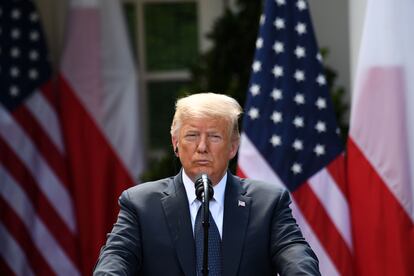Trump’s vandalism against the multilateral system, anew
If our leaders fail once more to coordinate against the American IDB proposal, the Trump administration will have advanced yet again in its nonsensical assault on international institutions

The ambition and activism of the Trump administration to undermine or even destroy international institutions seem to be unlimited and, sadly, manifestly unchecked thanks to other governments’ pusillanimous inaction. The latest act of Trump’s diplomatic vandalism is the nomination of a US citizen to the position of President of the Interamerican Development Bank (IDB). This action is in clear contravention of a long-standing understanding and practice that, in exchange for the institution being headquartered in Washington D.C., its head would always be a Latin American with an American as the bank’s deputy. The US commitment to the rule of having a Latin American leading the IDB is patently on record, shining forth in a speech given by President Eisenhower at the United Nations in August of 1958.
That feature of the IDB’s governance was one of several that made the institution exemplary, in fact a pioneer among international financial institutions. Not only were the intended debtors of the institution empowered to take a leadership role, provided that they were ready to supply the necessary resources, which they had offered and did, but they also created a truly development institution. From day one the IDB was accorded the possibility of financing broader programs of economic development, not just individual projects; it provided technical cooperation along with loans; and it was allowed to finance operations with the private sector without government guarantees. Tellingly, these and other development characteristics of the IDB were later copied and incorporated by the World Bank as well as other multilateral regional banks.
The IDB’s foundations have proven strong and efficacious for, while operating as a cooperative of owners, it has managed to support the economic and social development of the region and maintain its excellent credit rating. The IDB has been able to set itself apart from other regional development banks, in no small part due to its leadership and governance framework. As has been accurately observed, at some other regional banks, members have secured resources but little or nil influence, and at others, members have influence but few resources. At the IDB, members have both influence and resources. Majority ownership of capital along with a strong voice in decision-making and management, spearheaded by the presidency of the institution, have rendered the IDB both legitimate and effective. These qualities are now being threatened by the wrongheaded decision of the Trump administration and the feeble, rather genuflective, response so far by the Latin American and Caribbean governments.
Contrary to their usual rhetorical excesses on Latin American solidarity and unity, our governments have shown little of the latter in practice, not just of late but historically as well. If again our leaders fail once more to coordinate and unite against the American IDB proposal, the Trump administration will have advanced yet again in its nonsensical assault on international covenants and institutions.
The list of those infringements is now incredibly long. To name a few, consider the repudiation of the TPP; the withdrawal from the Paris agreement on climate change; the rejection of the Iran nuclear agreement; the downgrading of NAFTA into the USMCA; the withdrawal from UNESCO and the UN Human Rights Council; the termination of the Intermediate-Range Nuclear Forces Treaty and the foot dragging to extend the START treaty; the imposition of illegal tariffs on its trade partners and the undertaking of a full-scale trade war against China, all of this in circumvention of the rules and procedures of the WTO; the evasion of the latter’s possible sanctions by blocking the appointment of new members of its Appellate Body until it ceased to be operational; the abandoning of the Global Compact for Migration; and, bewilderingly, pulling out from the World Health Organization in the midst of a global pandemic.
All of these actions have two common features. One, they betray the past enlightened and effective leadership of the United States in the construction of a rules-based international system so crucial for global peace and prosperity. Two, they also betray the national interest of the United States by reducing this country’s influence and enhancing that of its purported geopolitical and economic adversaries and competitors.
It is time to limit, and fix if possible, the damage that the Trump administration has inflicted upon the international system. The WTO and the IDB are two good places to start. For some mysterious reason, the WTO current director general has resigned and therefore a successor must be elected. If the mistreatment of the WTO by the Trump government is any guide, then it is only reasonable to expect a process in which the US administration may choose to support someone adversarial to the institution’s mission, values and capacities, not unlike the case of the IDB.
For both pending appointments, forcing a delayed election of the new leaders until early 2021 would be the responsible action by the rest of the membership. This step would be justified certainly by the abnormal conditions posed by the pandemic that preclude a proper process of consultation and campaign by the candidates vying to lead those institutions, but also by the fact that by then there will be a new government in the United States hopefully willing to rectify the harmful policies pursued by the American administration since early 2017. This could be the case for any person democratically chosen by the US citizens. What if even a re-elected President Trump realizes in a few months how contrary to the US national interest his preposterous war on the multilateral system has proven to be?
Ernesto Zedillo Ponce de León is professor in the Field of International Economics and Politics at Yale University, Former President of Mexico.
Tu suscripción se está usando en otro dispositivo
¿Quieres añadir otro usuario a tu suscripción?
Si continúas leyendo en este dispositivo, no se podrá leer en el otro.
FlechaTu suscripción se está usando en otro dispositivo y solo puedes acceder a EL PAÍS desde un dispositivo a la vez.
Si quieres compartir tu cuenta, cambia tu suscripción a la modalidad Premium, así podrás añadir otro usuario. Cada uno accederá con su propia cuenta de email, lo que os permitirá personalizar vuestra experiencia en EL PAÍS.
¿Tienes una suscripción de empresa? Accede aquí para contratar más cuentas.
En el caso de no saber quién está usando tu cuenta, te recomendamos cambiar tu contraseña aquí.
Si decides continuar compartiendo tu cuenta, este mensaje se mostrará en tu dispositivo y en el de la otra persona que está usando tu cuenta de forma indefinida, afectando a tu experiencia de lectura. Puedes consultar aquí los términos y condiciones de la suscripción digital.




























































